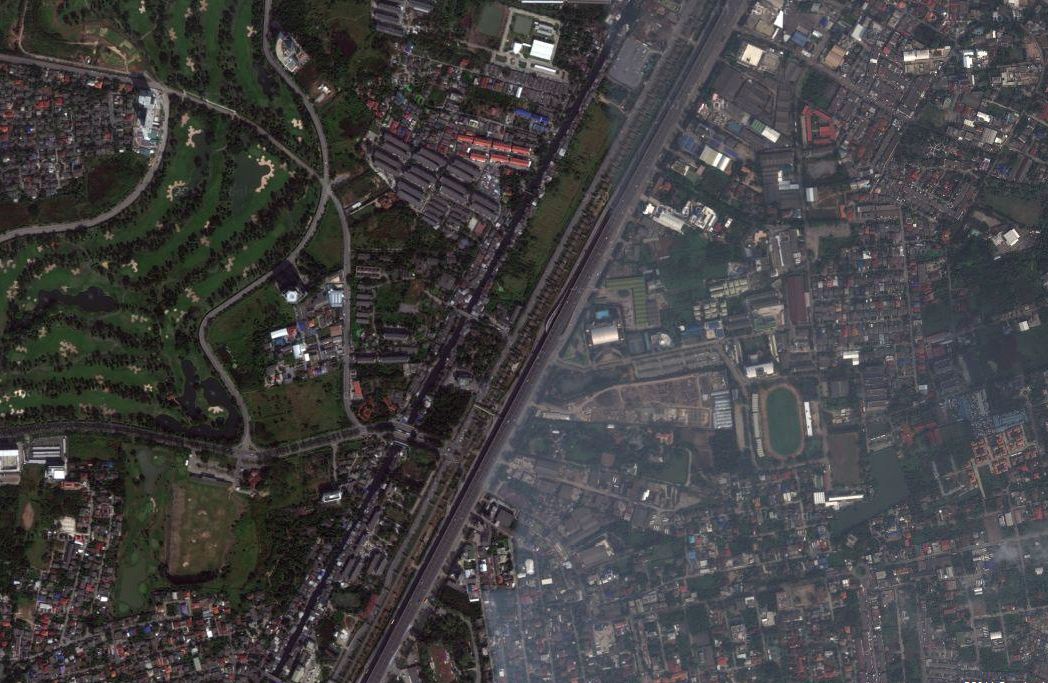Over the past several days, a series of reports have emerged about the possible recommissioning of an old detention centre to house political and other prisoners in Thailand. Much remains unclear about the possible plan, particularly the issue of precisely who might fall into the category “political prisoner.”
Articles in Krungthep Thurakij and the Bangkok Post reported that representatives from the Ministry of Justice, the Department of Corrections and the Special Branch Police have met to discuss recommissioning a decommissioned Special Branch site of detention at Bang Khen police school to detain security, political, and foreign prisoners [those awaiting deportation]. The detention centre was used for political detainees beginning in 1963 until being decommissioned and given to the Special Branch Police by Pirapan Salirathavibhaga, during his tenure as Minister of Justice under the recent Democrat Party government. The Special Branch has not stated using the space yet, which was slated for use as offices.
A range of reasons have been offered as an explanation for the possible recommissioned prison. According to the Thai-Asean News Network, the Justice Ministry denied that it was to possibly hold former Prime Minister Thaksin Shinawatra. The Bangkok Post reported that overcrowding was the issue, according to Chartchai Sutthiklom, the director of the Department of Corrections. Krungthep Thurakij went further, and elaborated on the issue of overcrowding, noting that “political prisoners detained with other ordinary prisoners has caused problems, including overcrowding and agitating the prisoners” [“р╣Ар╕Щр╕╖р╣Ир╕нр╕Зр╕Ир╕▓р╕Бр╕Ыр╕▒р╕Ир╕Ир╕╕р╕Ър╕▒р╕Щр╕бр╕╡р╕Бр╕▓р╕гр╕Щр╕│ р╕Щр╕▒р╕Бр╣Вр╕Чр╕йр╕Бр╕▓р╕гр╣Ар╕бр╕╖р╕нр╕Зр╣Др╕Ыр╕Вр╕▒р╕Зр╕гр╕зр╕бр╕Бр╕▒р╕Ър╕Щр╕▒р╕Бр╣Вр╕Чр╕йр╕Чр╕▒р╣Ир╕зр╣Др╕Ы р╕Чр╕│р╣Гр╕лр╣Йр╣Ар╕Бр╕┤р╕Фр╕Ыр╕▒р╕Нр╕лр╕▓р╕Хр╕▓р╕бр╕бр╕▓ р╕Чр╕▒р╣Йр╕Зр╣Ар╕гр╕╖р╣Ир╕нр╕Зр╕Др╕зр╕▓р╕бр╣Бр╕нр╕нр╕▒р╕Ф р╣Бр╕ер╕░р╕Бр╕▓р╕гр╣Ар╕Вр╣Йр╕▓р╣Др╕Ыр╕Ыр╕ер╕╕р╕Бр╕гр╕░р╕Фр╕бр╕Щр╕▒р╕Бр╣Вр╕Чр╕й”]. The word used for “agitate” [“р╕Ыр╕ер╕╕р╕Бр╕гр╕░р╕Фр╕б”] here is one laden with meaning and history; in the view of the repressive state, Communists agitated, for example.
Yet the most thought-provoking comment on the possible prison came a day later after the other reports, from Pirapan Salirathavibhaga himself. He wrote an article “New Prison for Political Prisoners?” [“р╕Др╕╕р╕Бр╣Гр╕лр╕бр╣Ир╕Бр╕▒р╕Ър╕Щр╕▒р╕Бр╣Вр╕Чр╕йр╕Бр╕▓р╕гр╣Ар╕бр╕╖р╕нр╕З????”] in response to the various reports and posted it on the Democrat Party website, or Thai Rat newspaper has a summary.
Much of Pirapan’s article is about his work decommissioning the former place of detention, but he is also at pains to repeatedly stress that there are no political prisoners in Thailand at the present moment. Recent reports from Reporters Without Borders, the ongoing work of Political Prisoners in Thailand, as well as the lived experience of Red Shirt detainees and lèse majesté prisoners, including Daranee Charnchoengsilpakul, would suggest that there Pirapan is incorrect on this score.
But let’s look at how Pirapan defines “political prisoner” [р╕Щр╕▒р╕Бр╣Вр╕Чр╕йр╕Бр╕▓р╕гр╣Ар╕бр╕╖р╕нр╕З]. Pirapan argues that many people misunderstand the category to refer to politicians have been charged with criminal actions. Instead, he notes that political prisoners are “Those who have been victimized by the side with administrative power to arrest or detain them due to fomenting a coup or because they have different political thinking. These are people who have not committed criminals acts” [“р╕Ьр╕╣р╣Йр╕Чр╕╡р╣Ир╕Цр╕╣р╕Бр╕Эр╣Ир╕▓р╕вр╕Чр╕╡р╣Ир╕бр╕╡р╕нр╕│р╕Щр╕▓р╕Ир╕Ър╕гр╕┤р╕лр╕▓р╕гр╣Бр╕Ьр╣Ир╕Щр╕Фр╕┤р╕Щр╕Ир╕▒р╕Ър╕Хр╕▒р╕зр╕лр╕гр╕╖р╕нр╕Др╕зр╕Ър╕Др╕╕р╕бр╕Хр╕▒р╕зр╣Др╕зр╣Йр╣Ар╕Щр╕╖р╣Ир╕нр╕Зр╕Ир╕▓р╕Бр╕Бр╕▓р╕г р╕Ыр╕Пр╕┤р╕зр╕▒р╕Хр╕┤р╕гр╕▒р╕Рр╕Ыр╕гр╕░р╕лр╕▓р╕г р╕лр╕гр╕╖р╕нр╣Ар╕Юр╕гр╕▓р╕░р╕Др╕зр╕▓р╕бр╕Др╕┤р╕Фр╣Ар╕лр╣Зр╕Щр╕Чр╕▓р╕Зр╕Бр╕▓р╕гр╣Ар╕бр╕╖р╕нр╕Зр╕Чр╕╡р╣Ир╣Бр╕Хр╕Бр╕Хр╣Ир╕▓р╕Зр╕Бр╕▒р╕Щ р╣Вр╕Фр╕вр╕Ьр╕╣р╣Йр╕Щр╕▒р╣Йр╕Щр╕бр╕┤р╣Др╕Фр╣Йр╕Бр╕гр╕░р╕Чр╕│р╕Др╕зр╕▓р╕бр╕Ьр╕┤р╕Фр╣Гр╕Щр╕Чр╕▓р╕Зр╕нр╕▓р╕Нр╕▓р╣Гр╕Фр╣Ж”].
Pirapan continues and notes that “The Department of Corrections does not have power under the law to hold this kind of prisoner” [“р╕Щр╕▒р╕Бр╣Вр╕Чр╕йр╕лр╕гр╕╖р╕нр╕Ър╕╕р╕Др╕Др╕ер╕Ыр╕гр╕░р╣Ар╕ар╕Чр╕Щр╕╡р╣Йр╕Бр╕гр╕бр╕гр╕▓р╕Кр╕Чр╕▒р╕Ур╕Ср╣Мр╣Др╕бр╣Ир╕бр╕╡р╕нр╕│р╕Щр╕▓р╕Ир╕Хр╕▓р╕бр╕Бр╕Ор╕лр╕бр╕▓р╕вр╕Чр╕╡р╣Ир╕Ир╕░р╕Др╕зр╕Ър╕Др╕╕р╕бр╕Хр╕▒р╕з”]. At another point in the article, Pirapan reiterates the lack of political prisoners in Thailand and then notes that “There are no political prisoners held in any prisons of the Department of Corrections” [“р╣Др╕бр╣Ир╕бр╕╡р╕Щр╕▒р╕Бр╣Вр╕Чр╕йр╕Бр╕▓р╕гр╣Ар╕бр╕╖р╕нр╕Зр╣Гр╕Щр╕Бр╕▓р╕гр╕Др╕зр╕Ър╕Др╕╕р╕бр╕Хр╕▒р╕зр╕Вр╕нр╕Зр╣Ар╕гр╕╖р╕нр╕Щр╕Ир╕│р╣Гр╕Фр╣Ж р╕Вр╕нр╕Зр╕Бр╕гр╕бр╕гр╕▓р╕Кр╕Чр╕▒р╕Ур╕Ср╣Мр╕Фр╣Йр╕зр╕в”]. Perhaps it is simply Pirapan’s style of writing, or my method of translation, but there seems to be a lacuna present here.
Does this mean that there are other places of detention, or other state agencies responsible for detaining political prisoners? Clarity would be welcome.
 Facebook
Facebook  Twitter
Twitter  Soundcloud
Soundcloud  Youtube
Youtube  Rss
Rss 